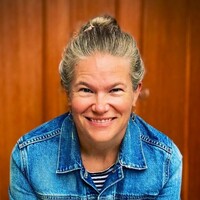Item
abstract
Dr. Margaret Dietrich
- Interviewer
- Ella Dietrich
- Date
- November 28, 2023
- Location of the Interview
- Shorewood, WI
- Length
- 44 minutes, 32 seconds
- Abstract
-
Margaret (Maggie) Dietrich, born in Rockford, Illinois, emphasizes the role of her early influences in family and at school. She remembers her family's values back then and today: deeply rooted in the church. As a member of the Episcopal church today, Maggie enjoys going to church as the “Rector’s wife” although sometimes relationships can feel odd because of her connection to the congregation’s leader. She acknowledges her Father’s logical advice to become a physical therapist but says she was truly inspired in graduate school to pursue a multi faceted career involving public health and social justice.
Reflecting on her diverse experiences—from being raised in the Midwest, attending Wheaton College, shortly residing in the cosmopolitan environment of Washington, D.C., and currently residing in a suburb with a history of racial inequity—Maggie discusses her engagement with the Black Lives Matter (BLM) movement. She remains attuned to current events through reputable and centrally political sources such as New York Times, The Atlantic and others in addition to moderate use of social media (Instagram Reels, and Facebook).
Maggie actively participated in the BLM movement during its peak amid the COVID-19 pandemic, engaging in protests, marches, and community outreach within the church and her own neighborhood. While initially aligned with the movement's objectives, she notes a halted momentum.
Sharing observations of the substantial response to the BLM movement in Milwaukee, Wisconsin, characterized by marches and community engagement, Maggie expresses some of the movement’s successes: discussions on race relations in familial and professional settings. She envisioned a more inclusive BLM movement that involved talk of the housing crisis and more health inequities between vulnerable populations and ones that have always been “on top”, fostering dialogue among individuals from diverse backgrounds to address the complex issues raised by the Black Power movement as a whole.
Part of Dr. Margaret Dietrich

